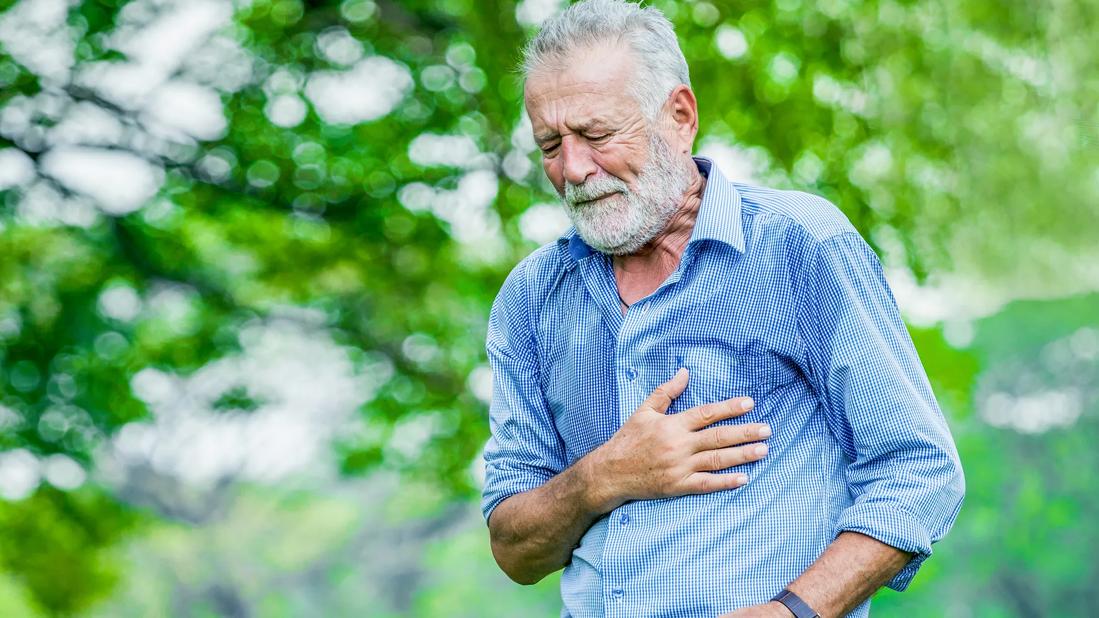Yes — and depending on the level of dehydration, you may need emergency care

Image content: This image is available to view online.
View image online (https://assets.clevelandclinic.org/transform/dfce7109-7d00-43da-9cdc-9b10ed5a2c61/heart-palpitations-920935232)
Older man walking outside, grimacing, clutching their chest
What do scary movies, public speaking and true love have in common?
Advertisement
Cleveland Clinic is a non-profit academic medical center. Advertising on our site helps support our mission. We do not endorse non-Cleveland Clinic products or services. Policy
They’re just a few things that can make you experience your heart skipping a beat (or racing, pounding or doing flip-flops).
In medical lingo, these feelings are called heart palpitations. And there are more causes of palpitations than you may realize.
“Strong emotions aren’t the only trigger of heart palpitations,” says cardiac exercise physiologist Erik Van Iterson, PhD. “Common triggers include exercise, pregnancy, caffeine and certain medications. Dehydration can also be a culprit.”
Heart palpitations aren’t usually dangerous. When you feel them, there’s typically no significant change in your heart rhythm — particularly when they rarely occur, are brief and aren’t accompanied by any other symptoms.
But if they happen when you’re dehydrated, heart palpitations can be more serious. That’s because they’re more likely to indicate your cardiovascular system is strained and experiencing a high level of stress.
Dr. Van Iterson explains the science behind dehydration-related heart palpitations and why you shouldn’t ignore them.
The link between dehydration and heart palpitations is mainly related to the fluid level in your body and your body’s need to efficiently use that fluid for important tasks.
Advertisement
Your circulatory system (heart and blood vessels) relies on regular blood flow and pressure to work properly. When blood enters your heart, it stretches your heart muscle. Your heart responds by contracting (tightening) to pump blood out to your body.
“When you’re dehydrated, there’s less blood volume and pressure available for stretching your heart, which is needed for generating powerful contractions,” Dr. Van Iterson explains. “Your heart has to compensate by beating more frequently and working harder to pump blood around. These responses can be quickly exaggerated during even light exercise and physical activity. This type of elevated heart rate and extra work can momentarily cause uncomfortable or unusual feeling beats regardless of whether you are at rest or exercising.”
Dehydration also tends to disrupt your electrolyte balance, resulting in cardiovascular strain that can affect your heart function.
Electrolytes play an essential role in your heart’s electrical conduction system. An imbalance of too many or too few electrolytes can provoke various types of arrhythmias and lead to symptoms like palpitations.
It’s not always easy to figure out what’s causing your heart palpitations. If dehydration is one of the main reasons, you’ll likely have one or more other symptoms, such as:
Oftentimes, you can pinpoint the source of dehydration based on your recent activities or medical history. Common causes may include:
If you have heart palpitations due to mild dehydration, drinking water should help you feel better quickly. If you’ve lost fluids due to exercise, vomiting or diarrhea, a drink that contains electrolytes may be more effective.
Be sure to avoid products that could make dehydration worse, such as:
“No perfect universal timeframe exists to know if you could be experiencing symptoms associated with anything other than mild dehydration. But if your symptoms don’t begin to improve within minutes to several hours of drinking water or electrolyte drinks, you may be more dehydrated than you thought or experiencing a different health issue that may require medical attention. Call 911 or go to the emergency room,” Dr. Van Iterson urges. “The emergency team can evaluate you thoroughly and give you IV fluids and other needed treatments.”
Advertisement
Also seek emergency care if you have other severe, heart-related symptoms, including:
For repeated bouts of dehydration associated with heart palpitations, Dr. Van Iterson recommends talking to your healthcare provider. They can help find the source of the problem and suggest strategies to prevent dehydration before it starts.
Advertisement

Sign up for our Health Essentials emails for expert guidance on nutrition, fitness, sleep, skin care and more.
Learn more about our editorial process.
Advertisement
If you don’t have other symptoms, try using relaxation techniques and vagal maneuvers to calm your heart down
A skipped heartbeat is usually your heart returning to its normal electrical path
Don’t self-medicate with vitamin supplements without consulting a doctor first
Too little magnesium can make your heartbeat go off beat
High heart rate, pain and dizziness can signal something more serious than a skipped beat
6 ways to avoid heart flutters or calm a racing heart
Making a health plan with your doctor before you leave will make it easier to sit back and enjoy your flight
From heartburn and panic attacks to muscle spasms and heart attacks, lots of medical conditions can cause chest pain
Although it could be used as a moisturizer, this new trend is not recommended
Communicating clear limits helps protect your time, energy and emotional well-being
High cholesterol can be genetic, but testing and treatment can lower your heart disease risk